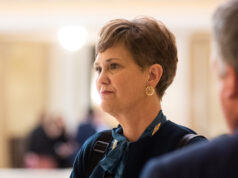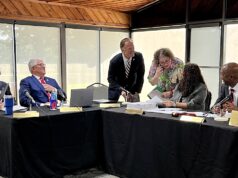
The governing board of the Oklahoma Broadband Office in a special meeting today agreed to salary terms with director Mike Sanders, whom members voted to hire last week at the urging of Gov. Kevin Stitt.
And board members finally got around to approving minutes of their Feb. 15 and March 3 meetings, giving the public a chance to review the official record of prior meetings. Told last week the minutes weren’t prepared, board members voted to table their approval and proceeded to conduct other business.
There were questions raised on the board’s actions after members first agreed to hire an out-of-state applicant as director during the March 3 meeting and then decided March 22 to hire Sanders, a former Republican state representative from Kingfisher.
The March 3 minutes chronicled the board’s original decision:
Motion by Roggow: Authorize Chairman Fina, contingent on satisfactory completion of due diligence, to offer the executive director position to Candidate D at a salary within the pay range previously authorized for the position by the Board.
Three days after that meeting, Gov. Kevin Stitt’s deputy chief of staff left a voicemail requesting the consideration of Sanders, and the member of the board who made the motion to hire the prior candidate — Duncan Area Economic Development Foundation director Lyle Roggow — was replaced.
The board voted to hire Sanders on March 22.
‘He’s motivated and excited about the job’
On Friday, board members opted to stay in open session instead of going into a closed session to discuss Sanders’ salary. The board last week authorized Chairman Mike Fina to offer $180,000 to Sanders. The range for the position had been $175,000 to $205,000. Sanders requested $185,000, which the board approved, 6-0.
“He’s motivated and excited about the job,” Fina said. “I think we picked the right man.”
Fina said Sanders will start in his new position April 10 and is moving quickly to dissolve his consulting business. He was not present during today’s meeting.
Minutes of the March 3 meeting show that after coming out of executive session, board member Lyle Roggow made a motion to authorize Fina, contingent on satisfactory completion of due diligence, to offer the executive director position to Candidate D at a salary within the pay range previously authorized by the board.
Roggow, the director of the Duncan Area Economic Development Foundation for 16 years, was on the board’s search committee for the executive director, a process that began last fall. Four candidates were interviewed March 3, and Roggow said the candidate whom the board preferred that day had the most knowledge about broadband issues and the importance of making sure money was spent on getting broadband to underserved parts of a state.
Three days after the March 3 meeting, Roggow received two calls from members of the Stitt administration. He said he did not recognize the first number and let it go to voicemail while he was at lunch. That call was from Stitt’s deputy chief of staff, former Republican state Rep. Josh Cockroft, who asked Roggow to consider Sanders for the broadband post, even though Roggow and the rest of the board had selected another candidate three days prior.
The second call came about three hours later from Stitt’s appointments director, who said the governor was removing him from the broadband board.
‘Contingent on satisfactory completion of due diligence’
The Broadband Governing Board is made up of nine members. Three are appointed by the governor, two are chosen by the speaker of the House of Representatives, and two are selected by the Senate president pro tempore. Lt. Gov. Matt Pinnell and State Treasurer Todd Russ also serve on the board, by statute. Roggow was appointed by Stitt.
On March 9, Stitt replaced Roggow with Amanda Mullins.
Friday, Mullins voted to approve the minutes of both the Feb. 12 and March 3 meetings, even though she had not yet been named a board member at the time of those meetings. After a member of the media raised a question about her vote, a staff attorney for the OBO governing board said Mullins could either abstain from voting or vote if she had read the minutes before today’s meeting. Mullins said she had read the minutes and kept her yes vote for approval. Minutes of all three meetings passed, 6-0.
Minutes from the March 22 meeting showed that Erhart made the motion to authorize Fina to offer the executive director position to Candidate F consistent with the salary range previously approved by the board. All nine members approved the motion.
Fina, executive director of the Oklahoma Municipal League, said after the March 22 meeting that he never made an offer to the earlier front-runner. The main concern with that applicant was his lack of familiarity with Oklahoma.
The Oklahoma Broadband Office will administer about $1.6 billion in grant funds, with the goal of providing high-speed internet service to the vast majority of Oklahomans by June 2028, when the office will be closed. Of that funding, American Rescue Plan Act money has to be spent by the end of 2024.
The board and office were created in HB 3363, which was enacted last year. The board is responsible for broadband expansion policy and overseeing the broadband office.
The Legislature has allocated about $382 million of federal American Rescue Plan Act money to the OBO to fund various projects across the state. The OBO has received 139 broadband requests, which total about $4.3 billion.





















